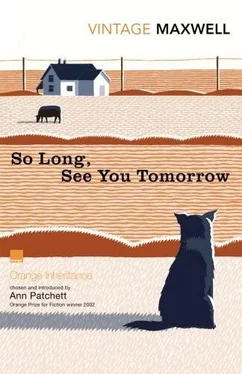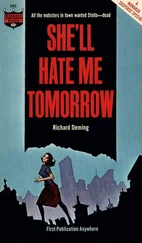When I came home from Scout meeting, the aerial on the roof showed faintly against the stars. Before I walked into the house I left the front walk and went and peered through the crack of light between the drawn shade and the sill of the living-room window. I wanted to make sure that my father and Grace weren't having a "party." The word had undergone a sinister metamorphosis. Originally it meant ice cream in molds and other children arriving with presents for me, or if it was a grown-up party then the best linen tablecloth and place cards and little paper cups full of nuts and a centerpiece of cut flowers from the greenhouse. And more spoons and forks than usual. During Prohibition it came to mean people getting together for the purpose of drinking. Gossip made it sound worse than it was; there were limits. But I didn't know what they were and therefore assumed that there weren't any, and that if "parties" were not orgies exactly they were in that general area. Among Grace's friends were a handsome raven-haired woman who had a year or two before lost her husband and a humorous unmarried woman who worked at the bank. They were both at our house a good deal and my father referred to them jocosely as his harem. I knew that they weren't really, but what was I to think when I heard them laughing about how Lois went upstairs and took off all her clothes (at my mother's parties people didn't do such things) and came down wrapped in a bath towel and did the hootchie-kootchie dance? Anyway, I didn't want to blunder into something like that, so I looked before I walked into the house.
After a short while, all this I now think rather jolly behavior had stopped. It was merely a manifestation of the times and did not reflect their true personalities. They settled down into something like the ordinary quiet life of most married couples.
Grace could whistle like nobody's business, and I have a vivid memory of her rendition of "Here's to the heart that beats for me, true as the stars above. Here's to the day when mine she'll be. Here's to the girl I love," as she made her way backwards down the stairs with a dust mop. It is like a still from an old movie. She never gets to the bottom of the stairs. In the remaining ten years before I took off for good, she was never impatient with me and I don't think I was ever rude to her. There was enough self-control in that household for six families. Unlike the wicked stepmother in the fairy tales, she had a gentle nature and could not bear any kind of altercation. And it was not in her to wrestle, like Jacob with the angel, until I stopped being faithful to a dead woman and accepted her as my mother. Instead she chose the role of the go-between. When my older brother had a Saturday-night date and wanted my father to let him have the car, he enlisted her aid and went off with the car keys in his pocket.
Grace's mother lived directly across the street from us with her son Ted, who was at that time a bachelor. Mrs. McGrath was a stately, warm-hearted old woman, much looked up to by her children. Grace's brothers were jovial, exceedingly kind men who, together, on next to nothing, had started a sand and gravel business and been successful. They loved to tell funny stories and whenever they were gathered together there was the sound of laughter. They also confused me by treating me as if I were a genuine relation. I didn't so much hold out against them as proceed with caution.
In that insufficiently heated bedroom on the northwest corner of the house in Park Place I was taken by surprise by the first intimations of a pleasure that I did not at first know how to elicit from or return to the body that gave rise to it, which was my own. It had no images connected with it, and no object but pure physical sensation. It was as if I had found a way of singing that did not come from the throat. I stumbled upon it by accident and it did not cross my mind that anybody might ever have had this experience except me. Therefore I did not connect these piercing exquisite sensations with the act of murder that removed Cletus Smith from Lincoln, or with what other men and women did that was all right for them to do provided they were married. Or even with what older boys talked about in the locker room at school. It was an all but passive, wholly private passion that turned me into two boys, one of whom went to high school and was conscientious about handing in his homework and tried out for the glee club and the debating society and lingered after school talking to his algebra teacher. The other boy was moody and guilt-ridden and desired nothing from other people but their absence.
When I was in bed, with the light out, the two boys became one, and I thought about the aerial on the roof, and how the cold air above our house was full of unknown voices and dance music, from a radio station downtown and from stations in Springfield and Peoria and Bloomington and Danville and Chicago and Kansas City. In college I read Shakespeare's The Tempest for the first time and was reminded immediately of what went on over the house in Park Place.
My father was offered a promotion that meant he would work in the Chicago office of the fire insurance company and be home every night like other men. At his age he didn't want to travel from one small town to another and be at the mercy of railroad timetables any more. Also, he was ambitious and gratified that they wanted him. My stepmother could not bear the thought of leaving Lincoln and her family and her friends. Night after night she wept while she and my father talked behind the closed door of their room. After a few years she could say that she preferred living in Chicago, but she was never again as lighthearted as she was before they left Lincoln.
The move to Chicago came in March but I stayed behind to finish the school year. I was taken in by old Mrs. McGrath. Her house had only two bedrooms, and for three months Grace's brother Ted and I slept in his room, in twin four- poster beds. One would have thought that having the company of a schoolboy was the one thing hitherto lacking in his very agreeable life. At night he took off his toupee and hung it on a bedpost, and as we were undressing he imparted his favorite words of wisdom to me, such as "Marriage is what takes the giggles out of the girls," or "You can't make a man mad by giving him money," or "All little things are nice." In the morning before school we all three crowded into the breakfast nook off the kitchen and ate buckwheat cakes and maple syrup. I persisted in feeling that I was putting them to a great deal of trouble when I don't suppose I was, actually.
When it was time for me to go to Chicago, Ted and another of Grace's brothers drove me there, stopping on the way to inspect a gravel pit in Joliet. They checked in at the La Salle Hotel, in Chicago, and we had dinner. As I stood gaping at the coffered ceiling, the like of which I had never seen before, they stuffed ten-dollar bills in my pockets. I didn't know whether it was right for me to take the money or not, and tried not to, but they assured me that it was perfectly all right, my father wouldn't mind, and in the end I took half of it. Instead of using the elevated railway, as I expected, we drove all the way from the Loop to Rogers Park in a taxi so I could see the city. As I looked out of the window at Sheridan Road they looked at me, and were so full of delight in the pleasure they were giving me that some final thread of resistance gave way and I understood not only how entirely generous they were but also that generosity might be the greatest pleasure there is.
Home was now an apartment on the second floor of a three-story brick building. The apartment house was a block west of Sheridan Road, in a quiet neighborhood, and Lake Michigan was only a short walk from where we lived. There were still lots of big old-fashioned single-family houses with front porches and trees and some sort of lawn and a homelike look to them. My father found a job for me in his office as a filing clerk, and he and I went to work together on the EI. In the evening the boys used to cluster on the sidewalk with their bicycles and I would walk by them with a dry mouth and my eyes focused on something farther down the street. I usually ended up at the Lake, where I sat on a rock pile looking out over the water. This went on for most of the summer, until one evening I found my way blocked by a bicycle wheel. The boy who was astride the bicycle asked if I was Jewish. It was not anti-Semitism, he was just curious. The circle opened and took me in. I mean, I could stand around with them and nobody objected to my being there.
Читать дальше












